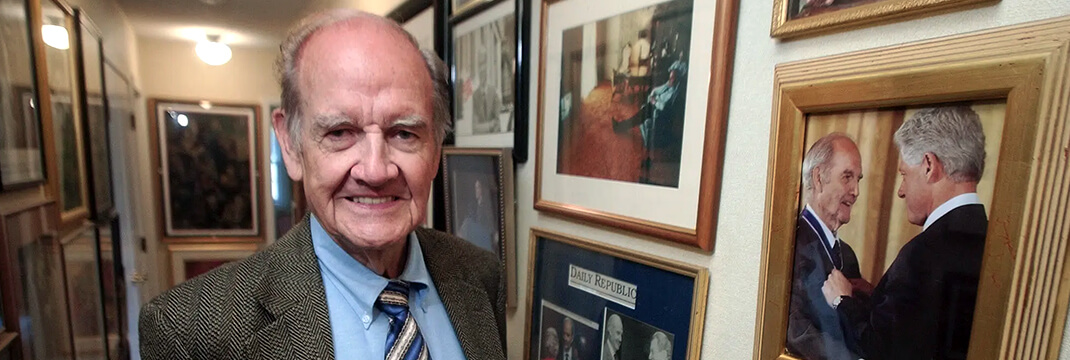
Abraham Lincoln was the sixteenth, and perhaps America’s best-loved and respected president. What made him so popular and beloved? The people liked him for his intelligence, strong principles, and moral uprightness. Before his presidency, when he was rather young, Lincoln was a highly ambitious person and a self-taught lawyer. In the book about Abraham Lincoln, McGovern focuses mainly on Lincoln as a president. The author discovers and tries to explain the president’s positions, his decisions regarding the Civil War, slavery, and emancipation.
1. What professional and political experience did Abraham Lincoln accumulate before becoming a president?
As stated above, Lincoln was a very ambitious person from his early childhood. His family was poor, and they lived in a very humble house (McGovern, Schlesinger, and Wilentz, 2008). At first, the future president worked as a clerk in the store in New Salem. When he was twenty-three years old, he started his political career. He decided to run for membership in the Illinois legislature, but, unfortunately, he failed. However, two years later he became a member of the Whig Party. Initially, he worked in the Illinois General Assembly, then in Congress for one term. He became a member of a new Republican Party in 1856. He ran for the US Senate two years later. Lincoln became famous because of the debates with Stephen A. Douglas. By 1860, he became the first Republican to win the presidential election.
2. Why did the Kansas-Nebraska Act in 1854 and Dred Scott decision in 1857 bring Lincoln out of private life and “rekindle” his political career?
Abraham Lincoln was a member of the Whig Party that operated in the US from 1832 to 1856; it complied with the position that the Congress is over the Executive Branch. He joined the House of Representatives in 1856. By the beginning of the 1850s, Abraham Lincoln had lost all his interest in politics and returned to the profession of a lawyer and to his Springfield practice. However, in 1854, the Kansas-Nebraska Act returned him back to politics and restored his concern in the sphere. In 1856, Lincoln enrolled in the Republican Party. Soon afterward, he became a new leader and was famous for his anti-slavery position. Democratic Senator Stephen A. Douglas’ Kansas-Nebraska Act (1854) allowed people from the above-mentioned territories to vote for allowing or outlawing slavery. Lincoln was the opposer to the Act of his adversary Stephen A. Douglas. The latter disagreed with Lincoln’s argument that the Founding Fathers had opposed slavery. Douglas remarked that many of them, including George Washington and Thomas Jefferson, had the slaves themselves. Lincoln argued that the Kansas-Nebraska Act could increase slavery as the majority of people would vote for it. On June 16, 1858, Lincoln delivered his “House Divided Speech” in the Illinois statehouse, where he said that the government would not be able to exist is half slave and half free (McGovern, Schlesinger, & Wilentz, 2008). That famous speech led to many discussions and arguments between Lincoln and Douglas; it attracted the attention of the whole nation. Both leaders conducted seven debates. Abraham Lincoln lost the election; however, his position brought him to fame. The campaign gave Lincoln national reputation, and he became the leader of the Republican Party.
Dred Scott was a slave who wanted to win his freedom through the American legal system. In March 1857, Dred Scott’s case was denied by the United States Supreme Court. The Court emphasized that no Afro-American was ever or could ever be a citizen. The decision deprived the Missouri Compromise (1820) of its legal efficacy. The Compromise had placed restrictions on slavery in some US territories. The decision of the Supreme Court enraged the Northern abolitionists and caused a revolt among them.
Lincoln publicly criticized the decision of the Supreme Court regarding Dred Scott. He argued that Afro-Americans must have the right to appeal in court for gaining their freedom. He stated that black people must have the same legal right to freedom as white ones. Dred Scott’s case became a starting point that contributed to the election of Abraham Lincoln as president in 1860.
3. What arguments did Lincoln make against southern secession? In what ways did he repress civil liberties during the war and otherwise “stretch the limits of presidential authority”?
Lincoln put forward the most important evidence. He proved that the secession was a crime against the Constitution. The government was a union of people but not states. Lincoln attempted to save the Union using a lot of methods. He asserted that the Union was unbroken according to the law. The secession was unconstitutional as the Union of the United States was “perpetual” and unlimited. What did that mean? In general, if someone tries to ruin the Union by seceding, it is against the Constitution.
In what ways did he repress civil liberties during the war and otherwise “stretch the limits of presidential authority”? Lincoln broke a record for the violations regarding civil liberties during the war period. During the Civil War, he made a lot to stop certain civil rights. However, there were a lot of tiresome debates regarding the constitutionality of Lincoln’s policies. The President planned and controlled the suspension of habeas corpus. He arrested the major separatists as he suspected the Maryland legislature in supporting the secession. In Missouri, the armed forces oppressed the civilians in order to reduce the rates of violent activities. However, the soldiers cruelly ill-treated both separatists and those who supported the Union. In 1862, Lincoln suspended some rights of habeas corpus throughout the whole country.
Abraham Lincoln dealt with the greatest crisis in US history. He faced the threat of the secession as the southern states proclaimed their independence from the Union and from the whole nation. He employed a lot of emergency powers aimed at defending the nation. The president used these emergency powers; that is why he put in place a naval blockade without the authorization of the Congress. He had imposed a military draft before Congress gave its official permission and approval. He always acted quickly and decisively. Before the Congress assembled, he had borrowed money to provide funding for the war. He proclaimed the martial law in the areas where the population was not faithful to the national government. He put critics, even newspaper editors, in military prison. At the same time, he set the people who were in detention in the insurrectional regions free. Lincoln once said that sometimes, in order to save a body, one must cut off an arm. He temporarily forbade the rights and ignored the law and legal procedures with the aim of saving the Constitution.
4. In his book, McGovern states that the Emancipation Proclamation “transformed the meaning of the war and redefined…the notion of freedom in America.” What was Lincoln’s early attitude towards slavery and racial equality? On what grounds did he justify emancipation?
On January 1st, 1863, during the third year of the Civil War, the President published the Emancipation Proclamation. It declared that all the people who were in slavery had to be free. However, that referred only to the states that were in rebellion. Such slave-holding border states as Kentucky, Maryland, Delaware, and Missouri were beyond the Emancipation Proclamation. The latter was issued by Lincoln at the right moment of the war, and it affected the Union positively. It also defined the main goal of the war. The Emancipation Proclamation is a symbol of equality and social justice even nowadays.
Lincoln thought that slavery was wrong and illegal, but there was an issue: the highest law, the Constitution, welcomed and approved it. Lincoln explained all his oppositions to slavery in his speech very clearly. Lincoln argued that all men are equal. In one of the debates with Stephen Douglas, Lincoln described his clear and stable thoughts regarding slavery. What he believed was that the black people, like other population, had the right to change their social position and to have some benefits and earnings from their work. The white and black men were equal, and, for this reason, slavery was unfaithful in itself.
Invite your friends and get bonus from each order they
have made!
Lincoln’s ideas regarding emancipation gradually developed throughout his presidency period. In his last speech on April 1865, he said that every man, regardless of his or her color of the skin, should have the right to vote (McGovern, Schlesinger, & Wilentz, 2008).
5. McGovern states that Lincoln began the Civil War advocating “limited war”, but later replaced it with “total war”. What does he mean by this? How did Generals Ulysses S Grant and William Sherman implement the policy of total warfare?
The armies of the Union and the Confederate fought only with each other; they did not cause any harm to citizens; they did not destroy the houses or other private property. Consequently, they called this type of war the “limited war.” Lincoln understood that they should introduce an innovative strategy to finish the war. The President and the Generals decided to start so-called “total war.” It was a new form of war. Total war was different. The Generals did not mean to kill people. However, their strategy was to destroy almost everything that the Confederate used for the war. Grant also participated in the campaign that attacked the economy of the Confederate. The “total war” was successful and helpful as the Union became even more superior and powerful.
6. What major domestic reforms were effected during Lincoln’s first and second terms?
Initially, Lincoln controlled the strategy of the Civil War. Afterward, he found Ulysses S. Grant; and the latter became the President’s trusted person. Lincoln also made some important changes in government policy that met the opposition. As he financed the war, he had to create the first income tax. In some territory, Lincoln ceased the writ requiring a person under arrest to be brought to judge or into court. In that way, he let the government arrest the separatists and nonconformists without any trial. The most important action was that he published the Emancipation Proclamation. Later, he added the thirteenth Amendment to the Constitution abolishing slavery.
Regarding Lincoln’s domestic policies, he supported the Homestead Act. According to the Act, poor people from the East could receive the land in the West. In addition to this, Lincoln signed a number of very important legislation. The National Banking Act initiated the national currency and started the creation of a national banks’ network. The tariff legislation was aimed at protecting American industry. Lincoln also signed the bill that chartered the first transcontinental railroad.
To sum up, the domestic accomplishments of President Lincoln were significant. First of all, he was in the position of authority during the Civil War, and because of him being a president, the Union became the winner. Lincoln published the Emancipation Proclamation that gave the official permission to the Army to defend the slaves. It also urged the border states to abandon slavery. The sixteenth President added the thirteenth Amendment to the Constitution regarding the abolishment of slavery in the United States. Lincoln also aimed at imprisoning the suspected secessionists. He was the first who imposed the income tax as he financed the expenses of the Union during the war (Mc Govern, Schlesinger, & Wilentz, 2008).
According to McGovern, Lincoln had the ability to concern on the principle tasks. That feature made him a genius in politics. Personally, he hated and opposed slavery; he fought against it and issued the famous Emancipation Proclamation. However, the emancipation was not his primary task. He focused on saving the Union as he thought it to be more essential than simply abolishing slavery.



